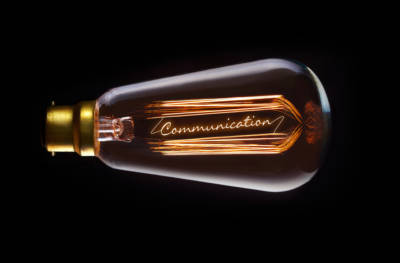Welcome to ELEVATE the Conversation
Here we will feature member posts and industry resources that provide information on building healthy habits. Each post will directly relate to one or more sections of the Fraternity’s Wellness Wheel model, which focuses on six core dimensions of health: emotional, physical, spiritual, social, intellectual and professional. Our goal is to share actionable steps for a healthier lifestyle that are relatable and accessible to our members. If you would like to be involved, want to submit an article for publishing, or have other resources to share, reach out to memberdevelopment@phikappapsi.com.
Listen . . . Are You?
By Tom Ford (Virginia Tech ’83)
Let’s talk about communication, more importantly listening.
Do you know what communication is? Do you know what effective communication is? Do you know there are just two aspects to communication? That’s right, there are just two. Just because there are only two that doesn’t mean effective communication is easy.

There are a few things that you must do to have effective communication. Notice I keep using the word effective. Many people attempt to communicate, but many times they flounder because many times they just want to hear themselves talk, or they don’t care to listen. When those things happen, that’s when effective communication goes out the window. I’ll be the first person to say I don’t always communicate effectively. As my wife has pointed out, If I’m not communicating about food, sports or fitness, then my communication tends to lack. I know plenty of men that have gotten the same feedback. Seriously, we all can work on increasing the effectiveness of our communication!
And there you have it! I just told you the two parts of communication. Did you catch them? The two parts are sending information and receiving information. Did you know we send and receive information utilizing all 5 senses? And did you know over 80% of all communication is nonverbal? Did you also know the hardest part of communication is receiving and understanding information or listening well!
That is what I am going to focus on here – Listening. I am going to give you ten keys to help improve your listening skills. The more people to have the ability and willingness to listen and understand, the better the chances of having improved communication!
Stop Talking.
It is almost impossible to talk and listen effectively at the same time. When we open our mouths to talk, our ears tend to close. Ask any teacher and they will tell you.
Prepare yourself to listen.
Focus on the message and/or topic being communicated to you. Focus on the speaker. Take a deep breath, and be present in the moment
Make the sender/speaker the focus.
Make eye contact,but don’t stare. Show you are listening and understanding. Put the needs and concerns of the speaker first.
Remove Distractions.
Put your phone down. Stop fidgeting. This includes everything from clicking a pen to picking your nails. Unnecessary movements cause distractions to yourself and others and can also send messages of boredom and inattention to the speaker.
Empathize.
Try to understand the point of view being given without judgment. You don’t need to agree, however understanding the point of view will help you construct a respectful and educated response. By having an open mind, we can more fully empathize with the speaker
Be patient.
Wait for the speaker to finish their message. People take their own time and way to get a message across. Give them that time and space. Don’t interrupt or finish their sentences.
Avoid personal prejudice.
Do the best you can to not be judgmental. Everyone is different in how they speak, including voice inflections, dialects and mannerisms. Focus on the message being sent, not critiquing its delivery or style.
Listen to the tone.
Speakers communicate with volume, tone and pitch. These delivery methods influence the message being sent and can sometimes help you to further understand someone’s point. Make sure you are being attentive to how the message is being communicated without being critical of it.
Listen to ideas not just words.
Listen to the whole idea, not just a bit here and there. Eliminating distractions is one strategy that will allow you to engage fully in the ongoing communication. With proper concentration and focus, these concepts will improve.
Pay attention to nonverbal cues.
As I mentioned before, 80% of communication is nonverbal. Use your other senses, smell, sight, in some cases touch and even taste. We don’t only receive information with our ears!
If these skills are utilized on a regular basis, your listening skills and abilities can improve.
Questions for Discussion & Reflection
Take some to personally reflect on these, or have a conversation with brothers about what you’ve read.
- Which of these tips is easiest for you to implement? Which one is hardest? Why?
- Consider someone who you’d call a good listener. What do they do that makes them so good at listening? Which of their strategies could you use?
- Think about a recent misunderstanding, frustration or conflict you’ve had with someone else. How did listening play a role in this? How could listening have helped?
Putting It Into Practice
Incorporate strategies into your daily life to become a better listener.
- Spend some time “people watching” for listening. Take time in a coffee shop, cafeteria, student union, or other public area to watch social connections in action. Seeing how others are putting these strategies into action (or not) can allow you to compare your own listening skills.
- Pair up with someone. Set a timer for one minute. For one minute, one of you should talk about a topic of your choosing. The other person should just listen and not give any verbal feedback. After one minute, switch places. Following the activity, discuss how this felt and any realizations you had on your listening tendencies.
- Watch for how listening is happening in the shows or movies you watch. Consider how listening (or failing to listen correctly) impacts the plot.
 A graduate of VA Tech with a BS in Exercise Science Tom has over 30 years experience in the fields of Athletic Training, Health Coaching and Education-working with such great organizations as VA Tech; Butler University, the Philadelphia Football Eagles, the YMCA, the NATA, and the ACSM to mention a few.
A graduate of VA Tech with a BS in Exercise Science Tom has over 30 years experience in the fields of Athletic Training, Health Coaching and Education-working with such great organizations as VA Tech; Butler University, the Philadelphia Football Eagles, the YMCA, the NATA, and the ACSM to mention a few.
With his passion for learning and helping others and his entrepreneurial spirit Tom has created companies- ARC2Enterprises; A Foundation for Health LLC and boq-Aquatic Exercise Equipment LLC. Through these companies Tom and his team have created aquatic exercise programming (BOQUA) and aquatic exercise equipment(boqs) His balanced approach to learning and serving others is guided by the principle that health is a state of being mentally, physically, socially and spiritually and each of us has the ability and responsibility to discover and establish that balance between the four.



